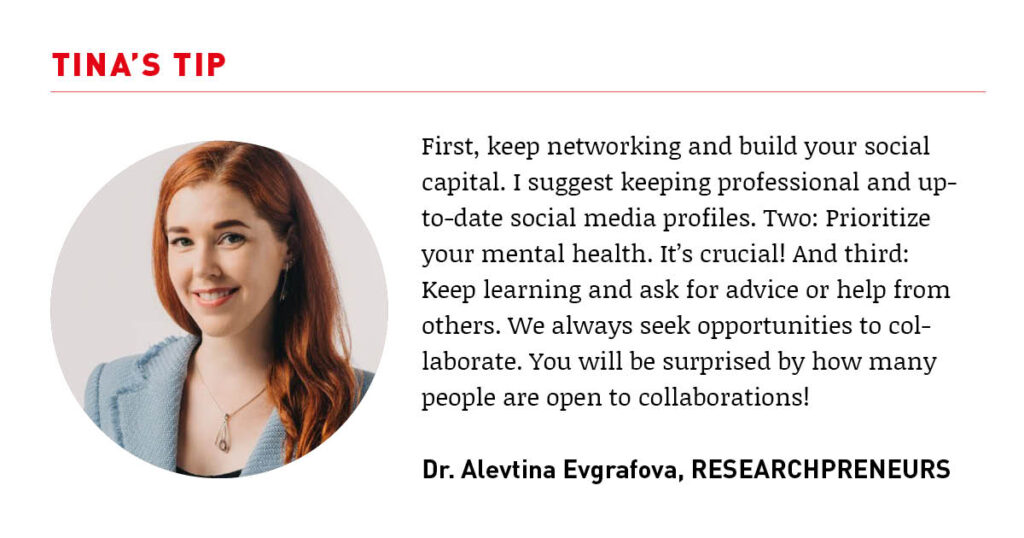
Connecting Scientific Knowledge Worldwide
Transitioning from Science to RESEARCHPRENEURS
Written by
Before transitioning into sciencepreneurship, Dr. Alevtina Evgrafova was building a career as a researcher in environmental sciences. After completing her PhD, she ventured into the startup world, elevating her aspirations for knowledge transfer to new heights. Explore her inspiring story of transitioning from a dedicated researcher to a sciencepreneur, culminating in the recent launch of her matching platform for applied researchers, RESEARCHPRENEURS!
What was the process like when moving from academia to entrepreneurship?
Transitioning from academia to entrepreneurship wasn’t an overnight shift for me. Recognizing the potential for a long-term journey, I focused on developing strategies to navigate this new path. As part of my preparation, I pursued additional education and obtained certification as a professional coach, adhering to ICF standards to become self-employed. As a mentor and advisor for researchers, I’ve noticed common challenges every researcher faces. That’s why I’ve decided to work on a bigger idea and build a startup that empowers researchers in our society.
In the early stages of your entrepreneurial journey, you were participating in one of our workshops in 2019. How did this experience affect your professional life?
In 2019, nearing the end of my PhD, I explored my career options. Having worked in an AgriTech startup, entrepreneurship looked interesting to me, but I felt unsure about how to begin. Attending the Young Entrepreneurs in Science workshop helped me explore this path, learning about business models and team building. It connected me with like-minded fellow researchers keen on entrepreneurship. Now, with RESEARCHPRENEURS we provide researchers with the opportunity to become freelance R&D experts while continuing their employment by enabling them to collaborate with small and medium businesses.
Therefore, we can call you a sciencepreneur now! Congratulations. What benefits have you encountered on your journey as sciencepreneur?
The benefit of having a scientific background is that “There are a lot of similarities between researchers and entrepreneurs: Both are innovators and create a positive social impact”. At the same time, the way of working is completely different. Researchers take their time to think before acting, as they have the luxury of having “time”. Meanwhile, entrepreneurs must react very quickly to go with the flow of the industry.
What do you think are the most critical problems on knowledge transfer between industry and academia and how can RESEARCHPRENEURS help to solve the problems?
In my opinion, the most critical problem regarding knowledge transfer is the slow bureaucratic processes, which can discourage industry engagement with academia. If we can speed up all these processes from getting a request to signing the contract, and start working, it would be more accessible and transferable to different stakeholders, and this is the main reason I founded the RESEARCHPRENEURS.
Is there anything you would have wished to know more about before becoming a sciencepreneur?
Definitely! I wished I had more overview on business and financial terminology before starting. Getting to know all business terms like CAC (customer acquisition costs) or CLV (Customer Lifetime Value) and mastering various business and pricing models would be essential for anyone entering the startup scene. While researchers are proficient in public speaking (pitching as called by startups), having more sales and marketing skills would be very beneficial. To address these gaps, I practiced to deconstructed every business into its marketing and strategic components, pricing models, and more, seeking the optimal approach to realize my vision. Additionally, team building is an overlooked key to success for aspiring entrepreneurs. Fortunately, the Young Entrepreneurs in Science workshop offered valuable insights into the joys of assembling a team from scratch along with Berlin Startup School.
Thus, what advice would you give aspiring founders?
Try it! My top advice is: keep networking and build your social capital. I suggest keeping professional and up-to-date social media profiles. Speaking about how we attract researchers across the European Union and plan to have a worldwide community: I often receive collaboration requests via social media. Tip number two: Prioritise your mental health. It’s crucial! And third: Keep learning and ask for advice or help from others. We’re a team of six, and we always seek opportunities to collaborate. You will be surprised by how many people are open to collaborations.

How could you find the investment for your startup?
In my situation, I took a strategic approach and began preparing myself in advance. I started setting aside funds as savings to support myself when I left my stable job. However, it’s essential to recognise that you can’t finance everything with your private sources alone. Attempting to do so is unrealistic and not advisable. Exploring government grants for the ideation stage of startups is a smart move due to the abundance of available programs. We benefited from a six-month Berliner Startup Scholarship by Startup Incubator Berlin in cooperation with the Berlin School of Economics and Law. Continuously seek out grants and start monetising your prototype right away, it also means that you’re heading in the right direction. Another tip I have is to be proactive in seeking investors for your startup. This emphasises the significance of networking and engaging with potential investors.
Thank you for the insights! How do you see the impact of your work on R&D experts?
RESEARCHPRENEURS aims to empower researchers by collaborating on project-based tasks while earning extra income and expanding their networks. We offer researchers the flexibility to choose between business tasks, allowing them to freelance for companies while maintaining their academic paths, provided there are no conflicts of interest. We believe that researchers can make a greater impact by collaborating directly with businesses on our platform and build a community of like-minded people.
What happens next?
Check out our event calendar for upcoming workshops. Stay tuned for more updates, opportunities, and success stories!
Curious for more? Connect with Tina and gain more information about Researchpreneurs!
Interviewer: Dilara Ekinci
Illustration: Ana Briceño
Art Director & Editor: Bianca Cramer







